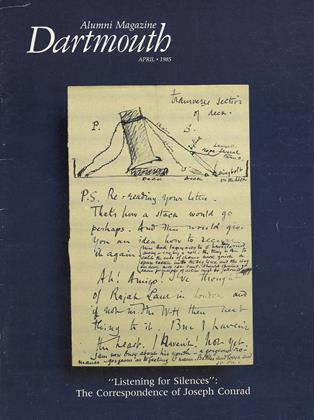Robert Skutch '46, Journey Without Distance. Celestial Arts, 1984. 137 pp.
In 1965, after she had spent her youth unsuccessfully seeking religious fulfillment and middle age actively avoiding the problem, Helen Schucman, a research psychologist at Columbia University Medical Center began hearing an "inner voice" that dictated to her what turned into a three-volume "course" in self-fulfillment. A Course in Miracles purportedly synthesizes Eastern philosophical concepts with Christian terminology and contemporary psychological insights. The story of Schucman and, peripherally, that of her book and the people who were drawn into its sphere, is here related by Robert Skutch, who generally keeps enough distance and relies sufficiently on the participants' own words to leave the reader free to offer his own explanation for the phenomena described.
Bruce Forester '6l, Signs and Omens. Dodd Mead & Company, 1984. 208 pp., $13.95. In the style and genre of his first "novel of suspense," In Strict Confidence, Bruce Forester again employs his background as a psychiatrist to pen a thriller. This one posits a mentally-ill President seeking guidance from a suicidal psychologist (and longtime friend) before embarking for a top secret meeting with his Soviet counterpart.
Charles A. Monagan '72, The ReluctantNaturalist. Atheneum, 1984. 112 pp., $10.95. If you have ever wondered whether a groundhog is really necessary for shadow-gazing on February 2, or whether a nuthatch or a Cheerios box would do just as well, Charles Monagan's humorous natural history will brighten both the bleakest winter's day and those interminable outdoor hours spent awaiting the appearance of a rarebird that doesn't want to be seen. Nature, as described by Monagan, is where you find it inside or out and this healthy send-up of those who are preoccupied by it is good medicine for naturalist and layperson alike.
Extending the Rafters, edited by Michael K. Foster, Jack Campisi, and Marianne Mithun. State University of New York Press, 1984. 422 pp., $48.50 (cloth), $16.95 (paper). The Dartmouth connection here is the volume's dedicatee, William N. Fenton '3O, a prodigious scholar in the field of Iroquois Studies who can rightfully be considered the modern father of that discipline. The range of subjects addressed in the papers on Iroquois history and culture that make up this "interdisciplinary approach" testifies to the intricacies involved in studying a Native American people, but the surprise is how many of them are of interest to the generally inquisitive reader willing to immerse himself in them. An en- tertaining, if not very flattering, account of Eleazar Wheelock's relations with Indians reminds us that if Dr. Wheelock's original goals had not been thwarted, he would have established his school among the Iroquois in upstate New York dare we consider that Dartmouth might now be Cornell?
 View Full Issue
View Full Issue
More From This Issue
-
 Cover Story
Cover StoryListening for the Silences
April 1985 By Laurence Davies -
 Feature
FeatureMinimum Standards
April 1985 By Gayle Gilman '85 -
 Feature
FeatureKey to Success: Dartmouth's Athletic Sponsor Program
April 1985 By Jim Kenyon -
 Feature
FeatureHistorical Notes on the Upper Valley
April 1985 By Jerold Wikoff -
 Feature
FeatureFROM THE DESK OF THE PRESIDENT
April 1985 -
 Article
ArticleWorth his salt
April 1985 By JOseph Berman '86
Books
-
 Books
BooksAlumni Articles
MARCH 1969 -
 Books
BooksSECOND WIFE.
DECEMBER 1963 By CLIFF JORDAN '45 -
 Books
BooksTall Tale
June • 1985 By M.W. -
 Books
BooksDEMOCRACY: MAN'S GREAT OPPORTUNITY AND THE COMMON CAUSE COLLECTIVISM: MENACE OR CHALLENGE
January 1950 By Robert B. Dishman -
 Books
Books87 MILLION JOBS.
JUNE 1963 By ROGER H. DAVIDSON -
 Books
BooksThe Regularization of Employment
May, 1926 By W. A. Griffin


